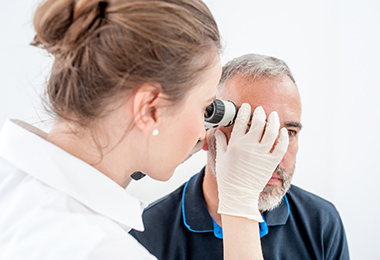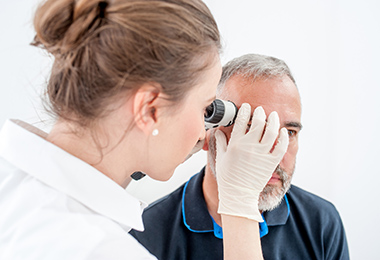Sarcoma of the Head and Neck
What are head and neck sarcomas?
Sarcomas are very rare tumors of connective tissue, which include fat, nerves, bone, skin and muscle. Head and neck sarcomas account for about 1% of head and neck cancers and 5% of sarcomas. Approximately 80% of head and neck sarcomas originate in soft tissue, while the remaining 20% arise from bone.
What are the causes of head and neck sarcomas?
The cause of most sarcomas is often not clear. Sarcomas such as Li-Fraumeni syndrome, familial retinoblastoma and neurofibromatosis type I can be hereditary in nature and passed genetically through families. They can also be caused by repeated exposure to toxins such as chemicals or radiation treatment for other cancers.
What are symptoms of head and neck sarcomas?
The most common symptoms of head and neck sarcomas include the following:
- A painless lump
- A facial, scalp or neck mass
- Jaw or ear pain
- A nasal mass or blockage
- Epistaxis (bleeding from the nose)
- Weight loss
- Difficult or painful swallowing
Johns Hopkins Head and Neck Cancer Specialists

Our head and neck surgeons and speech-language pathologists take a proactive approach to cancer treatment. Meet the Johns Hopkins specialists who will work closely with you during your journey.
How are head and neck sarcomas diagnosed?
- Physical examination — your doctor will perform a full head and neck examination, including an evaluation of the upper airway
- Imaging studies — a magnetic resonance imaging (MRI) and/or a CT scan may be ordered to demonstrate the extent of tumor involvement and determine if the tumor has spread to other parts of the body. Staging is an important component to determine the extent of the tumor and if it has metastasized (travelled outside the head and neck region)
- Biopsy — if a mass is confirmed with an imaging study, the next step is a biopsy so the pathologist can examine the tissue and provide a diagnosis.
How are head and neck sarcomas treated?
The initial treatment for head and neck sarcomas is surgery with the goal of complete tumor removal. Other therapies, such as chemotherapy or radiation therapy, may also be used before or after surgery. When used prior to surgery, radiation therapy and chemotherapy may help shrink the tumor. If radiation therapy is not used before surgery, it may be given afterward to reduce the risk of the cancer returning.
Other therapies, including biological therapy that targets specific weaknesses in the cancer, or immunotherapy to enhance your body’s immune system to fight the cancer, can be considered.
The specific treatment plans vary based on the following factors that your multidisciplinary team will take into account:
- Type of head and neck sarcoma
- Site and size of the tumor
- Extent of disease (whether it is localized, spread regionally or distant)
Johns Hopkins Head and Neck Cancer Surgery

Our team offers comprehensive treatments for cancers affecting the nasal passages, sinuses, the throat and nearby areas. Our head and neck surgeons work closely with medical and radiation oncologists, endocrinologists and other specialists to provide well-rounded care.






